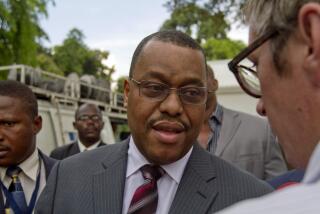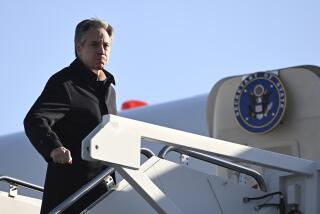CRISIS IN THE CARIBBEAN : U.N. Chief Begins Search to Replace Haiti Envoy Who Quit : Diplomacy: Dante Caputo complains angrily about U.S. highhandedness. He served in post for 22 months.
- Share via
UNITED NATIONS — Secretary General Boutros Boutros-Ghali launched a priority search Tuesday for a successor to the United Nations’ chief Haiti envoy, who has resigned and criticized the United States for a “total absence of consultations” in last-minute negotiations to persuade Haiti’s army leaders to step down.
Dante Caputo, who negotiated the 1993 Governors Island agreement on Haiti, asserted “the role of the United Nations has undergone an essential change” and that Washington had decided “to act unilaterally in the Haitian situation.”
Caputo, a former Argentine foreign minister, in a letter released Monday by the United Nations, blamed the Clinton Administration for failing to even tell him of the weekend talks Haiti’s generals had with former President Jimmy Carter, retired Gen. Colin L. Powell and Sen. Sam Nunn (D.-Ga.).
“The total absence of consultations, and even of information from the government of the United States of America, makes me believe that this country, in fact, has taken the decision to act unilaterally in the Haitian process,” Caputo said in his letter.
On Tuesday, in an interview in Argentina, he went further, asserting that the Administration had played into the hands of Haiti’s military leaders.
“This is just what he (Lt. Gen. Raoul Cedras, the Haitian strongman) wanted--to remain there and for U.S. rather than United Nations troops to land,” he said. “Cedras will not budge, he will remain and is likely to lead a new political force in Haiti.”
Under terms of the agreement forged by the team sent by President Clinton, Cedras must resign by Oct. 15 but is not obliged to leave Haiti.
At the United Nations, Boutros-Ghali accepted Caputo’s resignation with regret. Officials close to the secretary general also made it clear that the United States had acted in accord with the Security Council mandate to return ousted Haitian President Jean-Bertrand Aristide to power.
“Negotiations did not have to be cleared or coordinated further,” said a spokesman for the secretary general. “Clearly, Mr. Caputo felt he had not been included in this process, which was made into a bilateral process.”
The spokesman stressed that, under the Security Council-approved resolution, it was unnecessary for the Administration to consult with the council during the weekend talks with Haiti’s military junta.
The spokesman praised Caputo, saying, “He served for 22 months in one of the most difficult assignments imaginable, and he did it with great dedication.” He declined to discuss the weekend agreement or to say when the secretary general was informed about it.
Caputo negotiated the Governors Island accord between Aristide and Cedras. Cedras quickly ignored the pact, which called for the junta to resign and Aristide to be returned. Later efforts by Caputo to implement the accord proved fruitless.
Earlier this year, Caputo, elected in 1988 for a term as General Assembly president, displeased some U.S. diplomats, expressing misgivings that the United States would make the United Nations responsible for managing a difficult occupation of Haiti and would depart as quickly as possible.
Diplomats who spoke with Caputo after his letter was submitted said his resignation was expected. “He told me he has no role anymore,” one envoy said. The diplomat said Caputo was not bitter but favored multilateral negotiations over Haiti’s future.
Meanwhile, diplomats at the United Nations continued their wait-and-see attitude before lifting international sanctions against Haiti. U.S. officials said they were watching the situation closely, and other Security Council members indicated they were waiting for the Administration to introduce a resolution easing the embargo.
More to Read
Sign up for Essential California
The most important California stories and recommendations in your inbox every morning.
You may occasionally receive promotional content from the Los Angeles Times.













